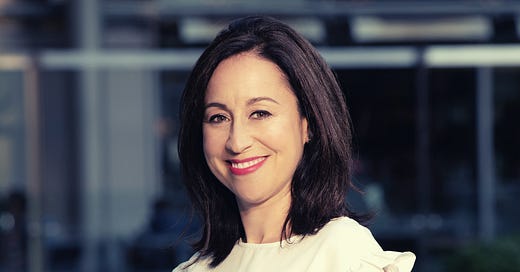Transcript: Katie Herzog
My interview with the American journalist and host of Blocked and Reported
Schools across the country are back in session — and this fall, the spotlight is on trans issues in the classroom. Saskatchewan and New Brunswick have come out with new policies for parental consent on student pronoun changes, and the Canadian Civil Liberties Association has launched a lawsuit, saying this violates the Charter and human rights. Add to that, this week, some parents marched in a cross-Canada protest against what they call gender ideology.
My guest on the podcast this week has been reporting on these issues for years, and she has thoughts on how we might inject some nuance into this polarized conversation.
Katie Herzog is an American journalist and host of the Blocked and Reported podcast.
This is an edited and condensed transcript for paid subscribers. You can listen to the interview for free here.
TH: Katie, welcome to Lean Out.
KH: Thank you so much for having me.
TH: It's wonderful to have you on, and the timing is good. It is Gender Equality Week in Canada, with Prime Minister Justin Trudeau tweeting about it. The culture war over trans issues has really come to Canada in recent months, with new school policies from Saskatchewan and New Brunswick on parental consent around student pronoun changes, legislation promised, and the Canadian Civil Liberties Association launching a lawsuit, saying these policies violate our Charter and human rights. In the meantime, the Leave Our Kids Alone March this week was planned as a million-person march against what they call gender ideology and overtly sexual material in school. We've also seen protests in recent months around these same issues from parents, including both Muslim parents and Christian parents. You are one of the earlier journalists in America to tackle trans issues, with a reported piece in The Stranger in 2017 about detransitioners — people who have regretted their decision to transition. This was a taboo subject then, and remains one now. For people who may be new to you and your work, I know you've talked about this a lot, but can you just give us the Coles Notes version of the fallout from that piece?
KH: Yes. As you mentioned, this piece was in 2017, so it's wild to watch what has happened. Six years later, a million people marching in the streets in Canada. I think this issue will be also one of the issues [for] the next American presidential election. I'm very much looking forward to President Biden being asked what a woman is. This article in 2017, it was really a profile of, I can't remember, maybe six detransitioners, and I took pains to — I guess the word I would use now is “virtue signal.” I wouldn't have used that at the time. But to show that I personally care about trans rights and am in favour of trans people having the right to transition — trans adults at least.
That didn't really matter. The piece was received very poorly, despite all of the hedging that I did to make sure everyone knew how I personally felt about this issue. The reaction, it was crazy. It was exactly what you would expect. Besides the online stuff. This was in Seattle, so a lot of the reaction was offline. There were stickers posted around Seattle calling me a TERF [trans exclusionary radical feminist] and a transphobe and a bigot. Later, there was another edition of the sticker that called me a Jordan Peterson apologist. That one was even more embarrassing. They put up pictures of my face on flyers around town calling me out. I had lots of backlash from my own community. I'm gay and most of my friends for the past 20 years have been in the queer community. Almost every one of them exited the friendship, without much explanation, because I think it became politically difficult for them to be associated with me. The fallout has really impacted me personally, even six years later.
That said, it was great for my career. Sometimes I think that I should send the people who put up the stickers calling me a transphobe a fruit basket, because they certainly called more attention to the piece. It's been really interesting to watch how this has all unfolded over the past few years. I would not have expected, six years ago, for this to be the culture war issue of the moment. But here we are.
TH: Marci Ien, Canada's minister of women and gender equality and youth, recently called this issue of parental consent on pronouns a “life or death” issue. It's very difficult to assess the arguments being made when the stakes are so high. On the one hand, people believe that any criticism of the trans activists’ program is a suicide risk for youth. On the other hand, we have people warning about irreversible medical interventions on minors, who they say are not developmentally mature enough to give consent. I really don't know how to have a reasonable conversation about this issue when the stakes are so high. Has anyone on either side of this debate managed to have a reasonable public conversation about these issues so far?
Keep reading with a 7-day free trial
Subscribe to Lean Out with Tara Henley to keep reading this post and get 7 days of free access to the full post archives.




